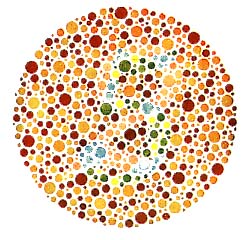Color-blindness and Video Games
By ahoodedfigure 11 Comments

At one time or another, a good chunk of the Giant Bomb staff has revealed that they're color blind. I think this is great, because I'm color deficient too, so I always hope that they'll at least mention when a developer isn't making the game accessible for the likes of us. Actually, there's a sizable portion of the general population that has some sort of difference in color perception that makes some colors indistinguishable from others, which means that it's smart for game designers to make systems with us in mind.
It's not too hard for designers to make things easier on us cripples; if you alter the darkness or lightness of the shades, then they're easier to tell apart, even for people lacking all color perception. If you get a bright green and a bright yellow that share about the same level, they may become almost indistinguishable for people with certain deficiencies, which can ruin a game.
Most game makers are savvy to this, and many of them actually put in systems which help the color blind out. This is especially true in puzzle games, where bright, different colors are often used to help the player figure out what pieces to use. One that instantly springs to mind is Puzzle Quest, where there are symbols on the gems as well as colors, so if we're having trouble with a color we can refer to the symbol instead. Games like Puzzle Pirates do that too, at least in some of the games. It just makes good design sense to be as inclusive as possible.
A game I could mention that's more mean about it is my current whipping boy Star Control 2, which has clues like "find the yellow star in the long constellation that looks like a beast which swallowed a big thing." OK, I think, some of these look yellow, some of these may be green but I'm not sure... that one looks long, wait, what?
Super Puzzle Fighter 2 was a pain for me, and I'd have to break out 3-D glasses and wear one filter on one eye to help me differentiate the yellow and green gems.
And so on.
What gets me is that often puzzles, both in puzzle games and in adventure games, often treat the color component as a sort of given. Everyone can see it (they think) so this is as easy as banging blocks together is for a toddler. I think companies are being better about this though, over time.
For those of us who don't quite have the patience to get a courtesy nod from mindful developers, there are some tools out there which are pretty handy. It didn't really work for the SC 2 problem above because the game used a mix of colors for stars that threw off the readings (so I couldn't tell exactly what color given things were) but the program Eye Dropper at least helped me figure out what colors were different from each other (link forthcoming).
As always, be smart about using software from vendors you don't trust. It works fine for me and I've had no problems, but you know the drill: run it through anti-virus and anti-malware software if you want to be sensible; the software designers may have turned evil since I last downloaded the thing:
This could be of use for just about anyone, really, if you wanted to see the color values of a given pixel. Mine does go a bit haywire with certain software, and I haven't tested the newer version out. If you do try it out, let me know in the comments what you thought about it. If I see no comments here I'll assume there was no interest or everything went fine :)
An interesting aside: we always assume that all cultures have WORDS for the same colors as we do. But Ancient Greek, for instance, supposedly didn't have a word for blue, or many colors at all. They talked about the bronzy sheen of the sky, rather than its color. Same for modern Chinese, at least Mandarin, which has a word for blue that doubles for the word blue-green, but many different words for red (words that pre-date red as a symbol for communism; the Russian positive association predates communism, too). I'm not talking about the goofy colors that they seem to invent so every corporation has its own patented shade of mauve, I'm talking basics here, words that have lasted for a long time. Makes me wonder if there are other color blindnesses lurking in the background, just because Westerners don't quite have the right name for them yet. It may be true that colors matter only if cultures think they matter, or perhaps the psychology of color is a lot more complex than we can put into words at the present time.
Another tidbit: while it's true that color blindness mostly manifests in genetic males, genetic females can get color blindness as well. It's a lot harder to get, genetically speaking, but it does happen.
This article was originally going to be specifically about Star Control 2, but I figured this topic was a bit more interesting (for me to write, and possibly for people to read). I have made some headway in SC2 since my last blog mention, to a point now where I sorta see what I've been doing to set certain problems in motion, and have been finding methods to counteract some events. At least I THINK these methods work. It's a lot of trial and error, and a lot of time has been spent experimenting and reloading.
The save game system, and modern gaming's dependency on it, might make a good topic for the future.

11 Comments